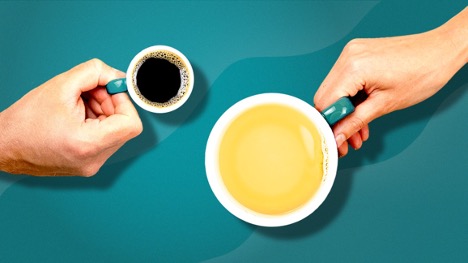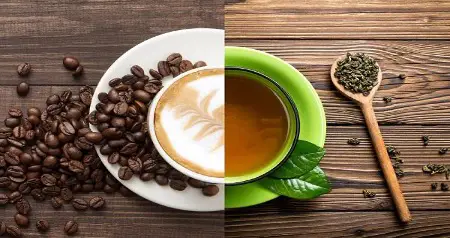Countless debates have been waged over the superiority of coffee over tea or vice versa. George Orwell may once have written that “tea is one of the mainstays of civilization in this country.” But, a large portion of the global population acknowledges that coffee deserves to earn the title of ‘the most popular beverage in the world.’ Probably, this is the reason that’s helping this refreshing beverage to invade the shores of Britain, China, India, Russia, and where not, creating stiff competition for tea.
Despite the jeopardy of being involved in such a sensitive and charged argument, we further decided to weigh up the relative goods and evils of each drink in terms of caffeine content. This post doesn’t account for taste or feel, but it has combed the scientific studies to gain an idea about the real and measurable effects of caffeine on our body and mind.
So, who’s going to win over this caffeine race – the beloved tea or the ever-gorgeous coffee? Let’s check out!
Prelude…
For many, the caffeine kick is the foremost reason for choosing either beverage. We often take caffeine as the fuel to our engines that allows us to throw off the morning creakiness. If we consider the composition, coffee wins hands down as a cup of tea that contains half the dose of the stimulant caffeine found in a standard cup of freshly brewed filter coffee.
So, when it comes to weighing the caffeine content in the light of its effectiveness as a wake-up call, it’s coffee that snatches away the winner’s crown. However, the aspects of this well-talked battle are not entirely covered yet. Let’s take this forward!
A twist in the story
Well, after digging the writeup till now, you must have made yourself ready to reach a conclusion like – “oh, it’s all about common sense, it’s coffee that has more caffeine – quite a well-deserved orgy…hahaha.” BUT, the story is not that predictable!
The exciting and surprising fact is, tea leaves are richer in caffeine content if compared to coffee beans. Caffeine is a natural pesticide present in both tea & coffee, and if you perform a genesis of the Camellia Sinensis plant (the sole species of tea plant), you will find that the caffeine level is a lot higher than that of the robusta or arabica coffee plant.
Thus, from the point of this specific consideration, tea leaves coffee behind as its plant houses much more caffeine than the coffee plant.
The brewing method directs the caffeine level
Apart from being beverages, tea and coffee share another common characteristic. Their caffeine content after brewing depends greatly on the brewing method. The following chart will give you a clear idea about this.
| Brewing method | Caffeine content | Size in oz. (ml) | |
| Tea | Brewed black | 47mg | 8 (237) |
| Brewed black, decaf | 2mg | 8 (237) | |
| Brewed green | 28mg | 8 (237) | |
| Ready to drink, bottled | 19mg | 8 (237) | |
| Coffee | Brewed black | 96mg | 8 (237) |
| Brewed black, decaf | 2mg | 8 (237) | |
| Espresso | 64mg | 1 (30) | |
| Espresso, decaf | 0mg | 1 (30) | |
| Instant | 62mg | 8 (237) | |
| Instant, decaf | 2mg | 8 (237) |
A logical curiosity
Now, after getting introduced to the fact that tea leaves hold more caffeine than coffee beans, you must be thinking, how does brewed coffee contain more caffeine? Well, the coffee brewing process requires hotter water, which extracts more of the caffeine from the beans. In addition, while brewing coffee, more coffee beans are used than tea leaves for a drink.
Due to this reason, typically, brewed coffee turns out to be a beverage that has enhanced caffeine content compared to tea.

Caffeine – A devil’s trumpet or the immortal nectar
Now, when the entire story revolves around caffeine, it’s indeed imperative to figure out the fact that caffeine benefits our health or it leaves a negative impact on our body? Let’s find out!
Usually, caffeine gets a bad rap, and we miss to include the array of nutritional benefits it offers. To keep it straightforward – caffeine is good for health; however, you need to keep in mind that excess of anything is bad. Therefore, when consumed maintaining the mentioned limit, i.e., 400mg a day, caffeine does more good than harm.
The benefits offered by caffeine include –
- Efficiency in boosting athletic performance
- Packs nutrients like vitamin B12 and B5
- Lowers the risk of type 2 diabetes
- An amazing mood booster
- A viable fat burner
- An antioxidant powerhouse
Therefore, to conclude, you can say that caffeine, when consumed sincerely, should be titled as ‘the immortal nectar’ instead of a devil’s trumpet! However, people with heart conditions and migraine should be a little careful when it comes to caffeine intake. For them, it’s always a better and safe option to rely on a cup of decaffeinated coffee or low caffeine tea.
What to pick – tea or coffee?

Be it coffee or tea; you should take care of a few things while choosing your beverage. The first one is quite obviously the beverage’s suitability to your personal taste. While the global coffeecionados stick to the belief that everyone should turn into a coffee lover, at the same time, it’s quite an acceptable fact that tea also has a separate fan base.
So, be it a cup of an English breakfast tea or a delectable brew of your favorite dark roast beans – pick up the one that you love the most. Besides, identify your craving for caffeine and choose coffee or tea, and it’s a sure thing that the job is easy for you now as the differences between caffeine levels in either drink are now broken down clearly.
While both these out-of-the-ordinary beverages have been around since time unknown, the comparison of the history behind tea and coffee may help the leaf-based beverage win a long shot.
According to numerous sources, the habit of consuming tea has been in existence since 2732 B.C, while the authentic coffee culture is believed to have been introduced in 1000 A.D.
Wrap up
In a nutshell, considering all the given facts, it can be said that coffee contains more caffeine than tea. The experienced author Amit from FriedCoffee simply suggests – those who are looking for a powerful morning beverage to give their day a more enthusiastic start may say a big yes to coffee.
However, tea lovers can continue celebrating their love for tea without compromising the caffeine need by just replacing a few cups of their daily tea with some shot of brilliant espressos. Long live caffeine!


